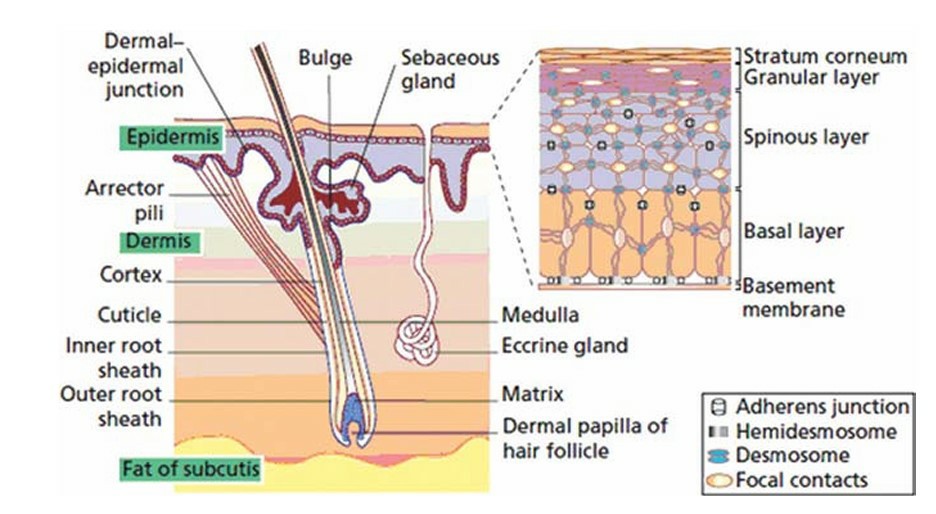Rare skin diseases pose unique challenges due to their low prevalence and limited treatment options. At our company, we specialize in providing tailored Therapeutic Development Services, covering all stages of preclinical research to address these complexities. Through advanced technologies and expert teams, we accelerate the discovery and development of innovative therapies.
Introduction to Rare Skin Diseases Therapeutic Development
Rare skin diseases are characterized by their low prevalence and high unmet medical needs, often lacking well-established treatment pathways. Advances in molecular genetics and personalized medicine have opened new avenues for targeted therapy development, addressing the complexities of these conditions. Leveraging cutting-edge technologies, therapeutic development now focuses on precision treatments, aiming to expedite research and improve outcomes for these challenging diseases.

Fig.1 Anatomy of the skin showing target sites for peptide therapeutics. (Namjoshi, S., and H. A. E. Benson., 2010)
Types of Rare Skin Disease Therapies
Therapies for rare skin diseases involve various approaches, each tailored to target specific mechanisms. The main types include:
- Small Molecule Drug focuses on modulating biological pathways involved in rare skin diseases. They target specific intracellular proteins or enzymes to control disease progression.
- Cell therapy involves the transplantation of healthy skin cells to replace damaged or dysfunctional ones, making it ideal for conditions involving tissue damage or severe blistering.
- Gene therapy aims to correct or replace defective genes responsible for rare skin diseases. This approach is particularly promising for inherited disorders such as epidermolysis bullosa.
- Monoclonal antibody leverages biologics, such as monoclonal antibodies, to specifically target and neutralize inflammatory or immune pathways involved in rare skin diseases.
- Therapeutic peptides are short chains of amino acids designed to regulate the biological mechanisms of skin diseases. They are highly selective and can modulate cellular signaling, making them suitable for skin fibrosis.
- Therapeutic protein involves delivering functional proteins to replace or supplement those that are missing or malfunctioning in rare skin diseases.
Our Services
At our company, we are proud to offer a comprehensive range of services to support our clients in developing innovative therapies for rare skin diseases. Our dedicated team of expert scientists, dermatologists, and geneticists harnesses cutting-edge technologies and deep expertise in the field to accelerate the advancement of your therapeutic projects.
Leveraging our extensive expertise, our distinguished organization provides a wide array of therapy development services from multiple perspectives, meticulously tailored to meet your individual needs. With our abundant experience, we are fully capable of tackling various aspects of therapy development, delivering thorough and personalized solutions.
Why Choose Us?
Professional core technical team.
Advanced experimental equipment.
Empowering success through cooperation.
Strict quality control system.
At our company, we are committed to providing comprehensive, one-stop preclinical development services that cover every aspect from disease model creation to innovative therapy research. If you are interested in our services, please don't hesitate to contact us.
References
- Namjoshi, S., and H. A. E. Benson. "Cyclic Peptides as Potential Therapeutic Agents for Skin Disorders." Biopolymers 94.5 (2010): 673-80.
- Vesely, M. D. "Getting under the Skin: Targeting Cutaneous Autoimmune Disease." Yale Journal of Biology and Medicine 93.1 (2020): 197-206.
All of our services and products are intended for preclinical research use
only and cannot be used to diagnose, treat or manage patients.


 Fig.1 Anatomy of the skin showing target sites for peptide therapeutics. (Namjoshi, S., and H. A. E. Benson., 2010)
Fig.1 Anatomy of the skin showing target sites for peptide therapeutics. (Namjoshi, S., and H. A. E. Benson., 2010)




